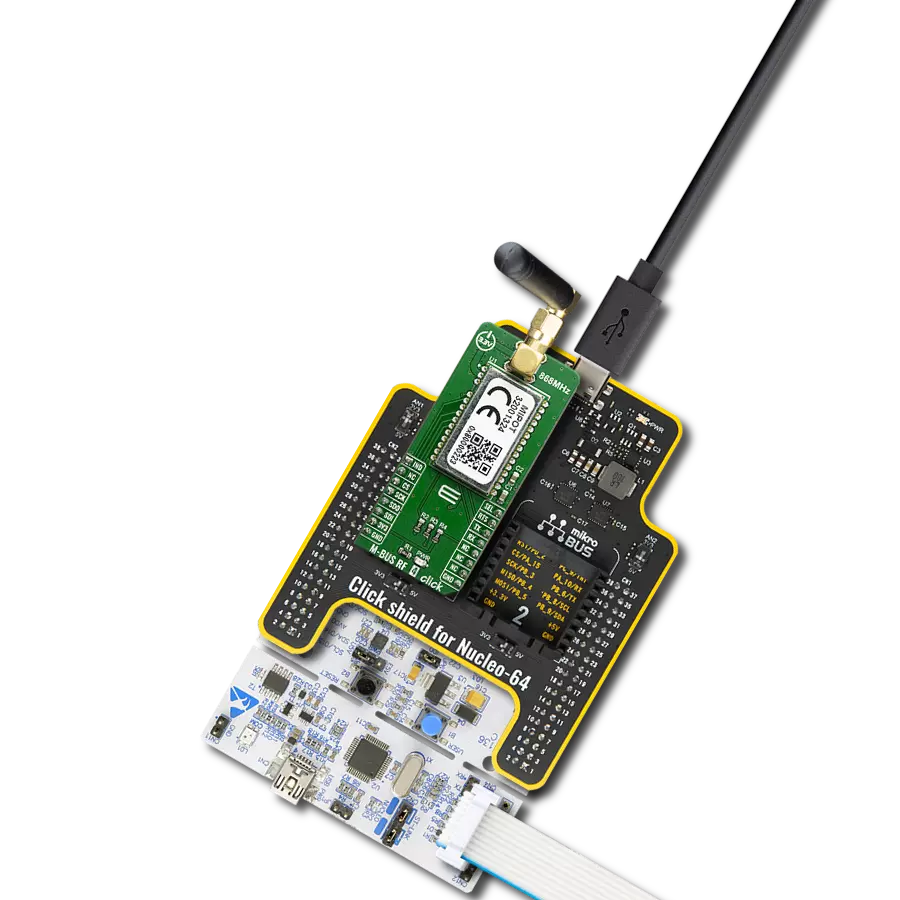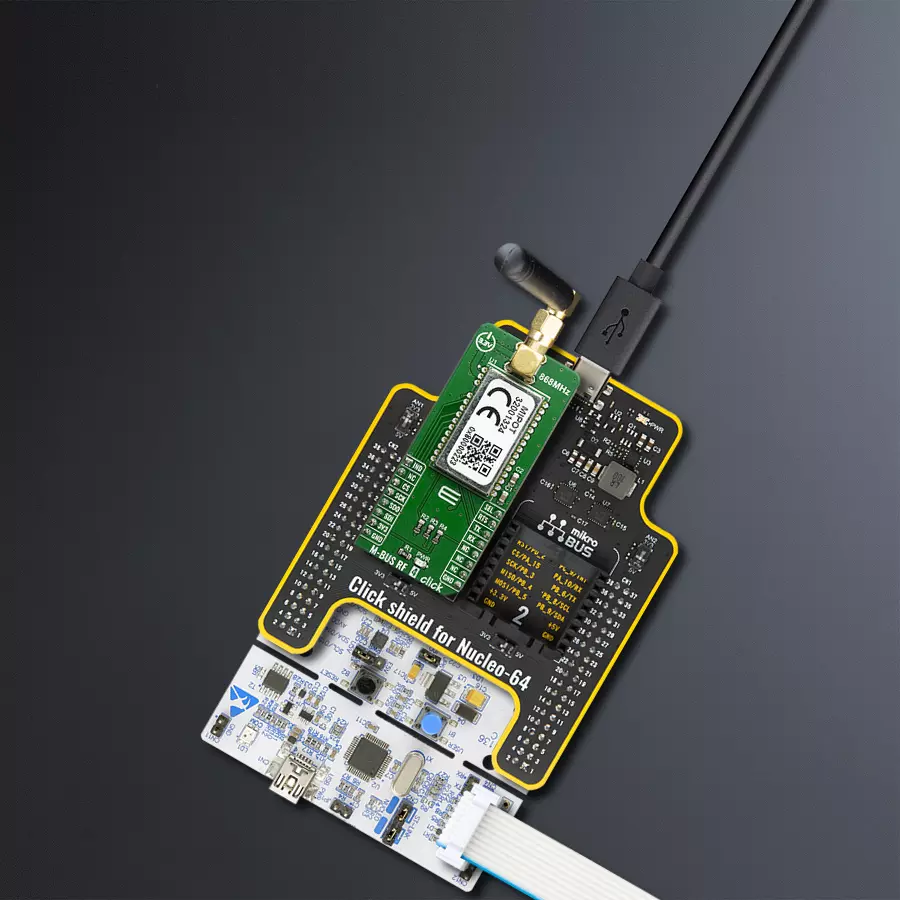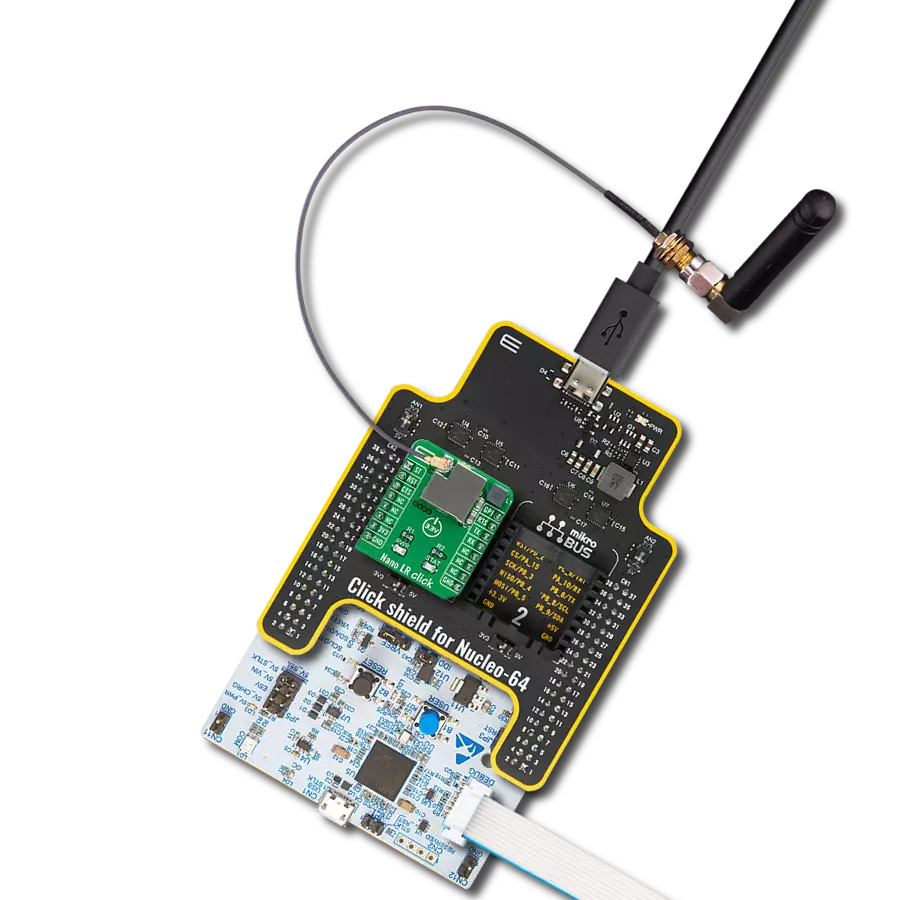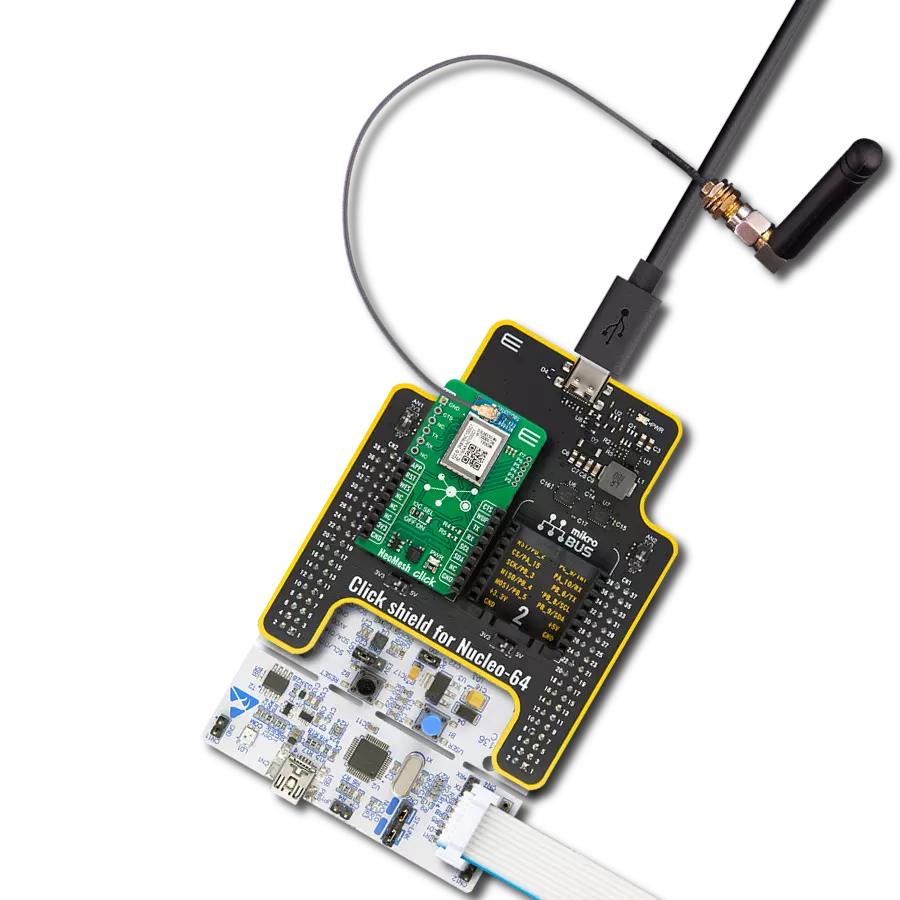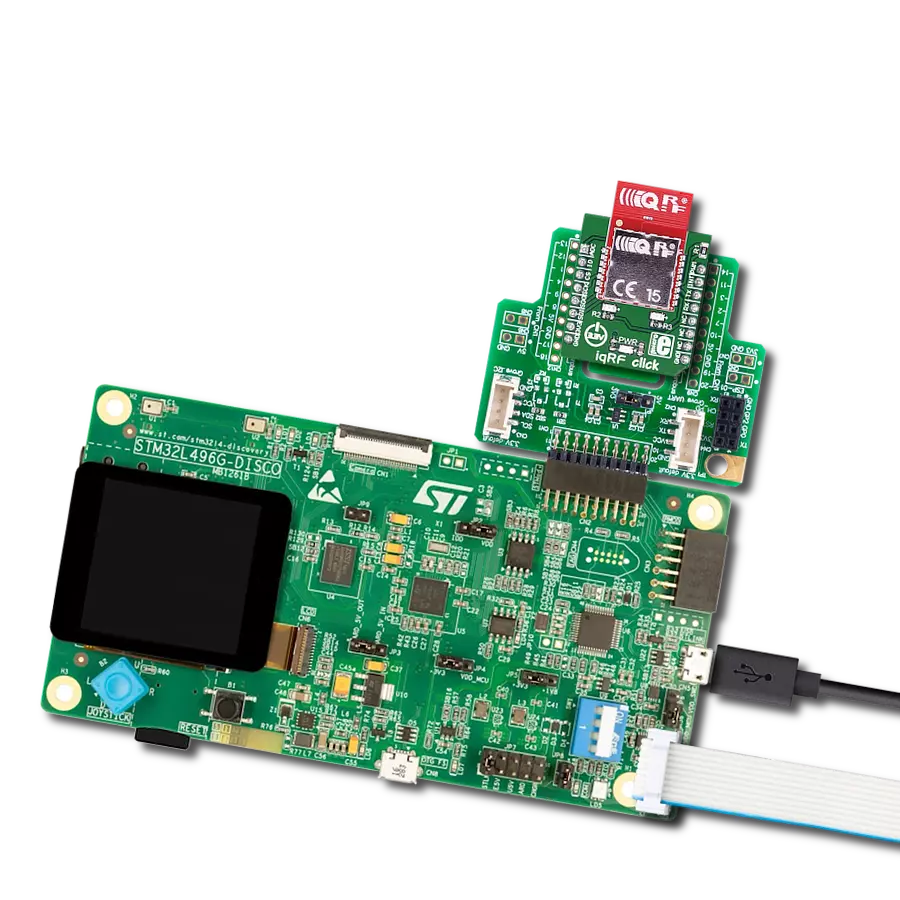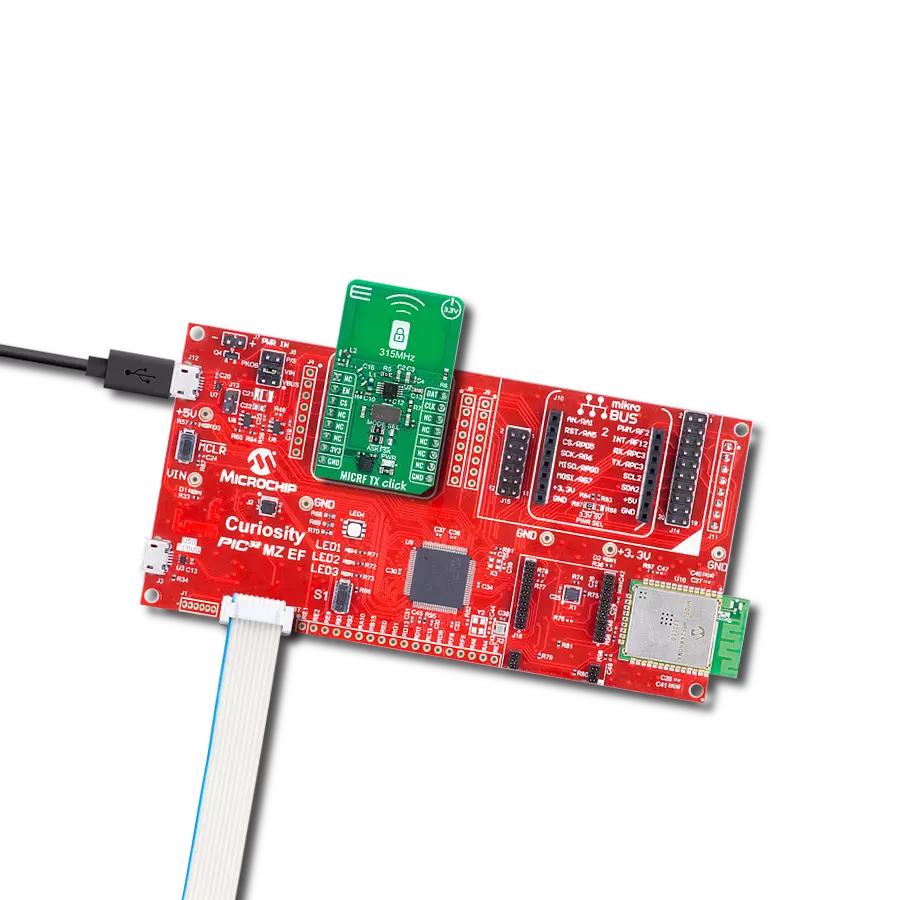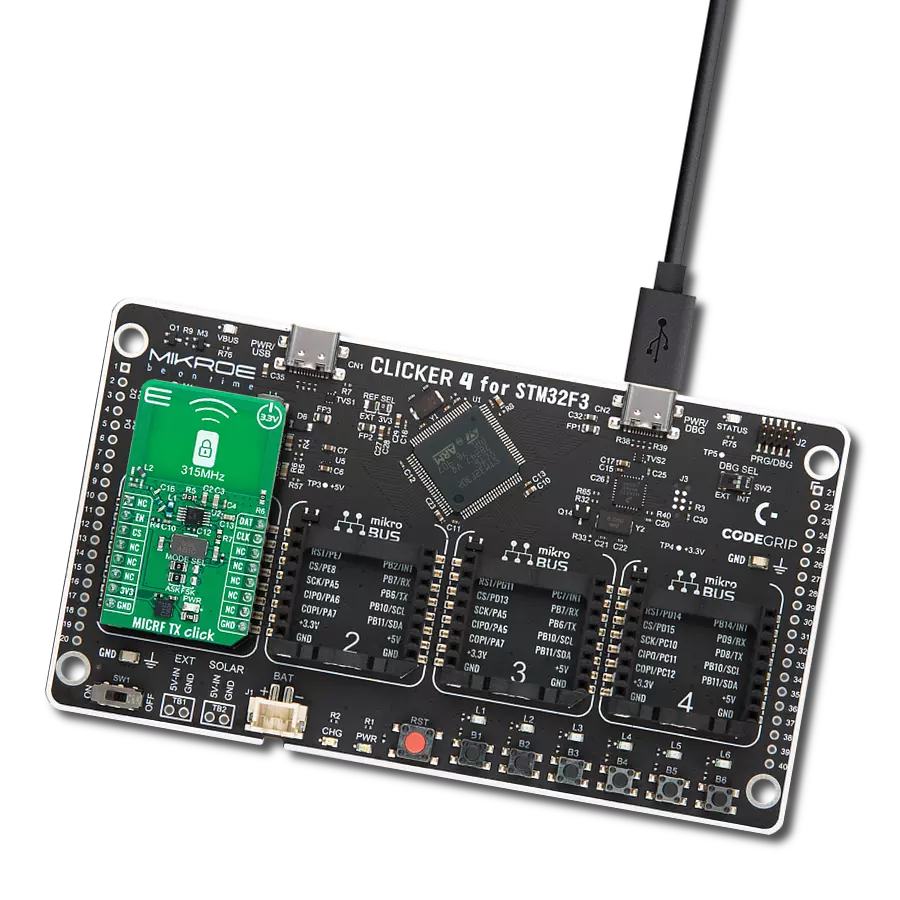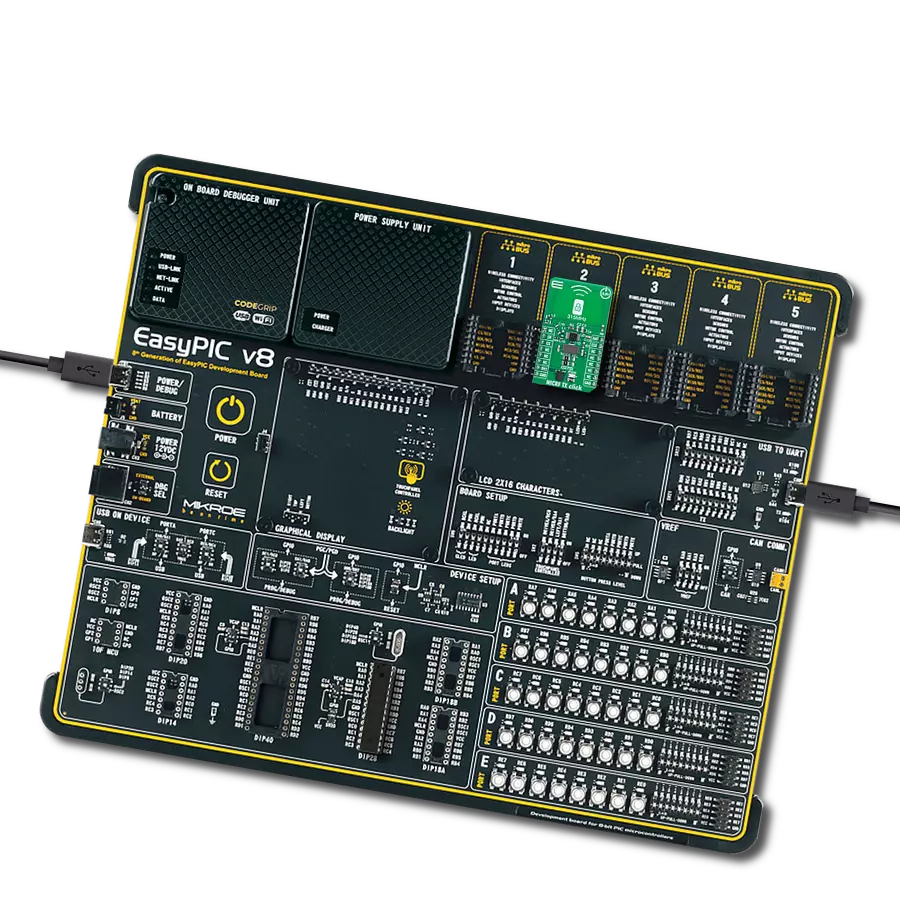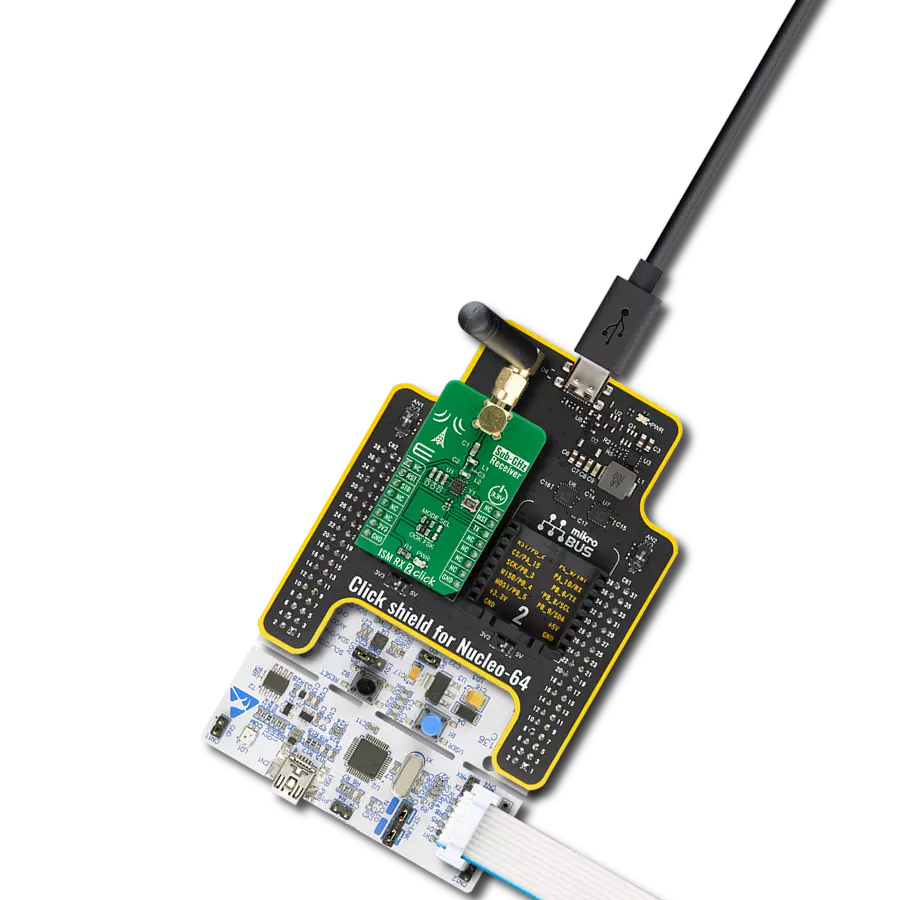Stay ahead in the world of metering solutions with the innovation and efficiency provided by our wireless M-Bus transceiver.
A
A
Hardware Overview
How does it work?
M-BUS RF 4 Click is based on the 32001324, an 868MHz band transceiver module from Mipot. The radio operates at the unlicensed 868 MHz SRD frequency band and has specified serial data rates of up to 115.2 Kbps. This M-BUS RF 4 click is ideal for developing various applications, mainly solutions for water or gas, as well as heat and electricity metering applications, and even on meter and concetrator devices. The module supports various operating modes (S, T, R, C) to meet the requirements of one-way and two-way data communication, in stationary and mobile systems. The embedded stack implemented according to EN13757-4 Standard provides the
physical access to the Wireless M-Bus communication. At startup time, the Module reads INTERFACE_SELECTION input pin state, which is routed to the PWM pin (marked SEL on Click board) of the mikroBUS™ socket. This pin should be left unconnected or set to high state to select the UART interface or set to low state to select the SPI interface for communicating with the main MCU. Widely used SPI and UART interfaces allow integration flexibility and easy development of customer products. The module meets all the requirements in the industrial temperature range -40/+85°C. Besides that, the module is also certified according to R&TTED 1999/05/EC
and is compliant with the ReACH And ROHS directives. The embedded stack implemented in the module according to EN13757-4 Standard provides the physical access to the Wireless M-Bus communication. M-BUS RF 4 click communicates with the target MCU through the mikroBUS™ UART or SPI interface, with additional functionality provided by IND, SEL, and RTS CS/CTS pins. This Click Board™ is designed to be operated only with 3.3V logic level. A proper logic voltage level conversion should be performed before the Click board™ is used with MCUs with logic levels of 5V.
Features overview
Development board
Nucleo-64 with STM32G071RB MCU offers a cost-effective and adaptable platform for developers to explore new ideas and prototype their designs. This board harnesses the versatility of the STM32 microcontroller, enabling users to select the optimal balance of performance and power consumption for their projects. It accommodates the STM32 microcontroller in the LQFP64 package and includes essential components such as a user LED, which doubles as an ARDUINO® signal, alongside user and reset push-buttons, and a 32.768kHz crystal oscillator for precise timing operations. Designed with expansion and flexibility in mind, the Nucleo-64 board features an ARDUINO® Uno V3 expansion connector and ST morpho extension pin
headers, granting complete access to the STM32's I/Os for comprehensive project integration. Power supply options are adaptable, supporting ST-LINK USB VBUS or external power sources, ensuring adaptability in various development environments. The board also has an on-board ST-LINK debugger/programmer with USB re-enumeration capability, simplifying the programming and debugging process. Moreover, the board is designed to simplify advanced development with its external SMPS for efficient Vcore logic supply, support for USB Device full speed or USB SNK/UFP full speed, and built-in cryptographic features, enhancing both the power efficiency and security of projects. Additional connectivity is
provided through dedicated connectors for external SMPS experimentation, a USB connector for the ST-LINK, and a MIPI® debug connector, expanding the possibilities for hardware interfacing and experimentation. Developers will find extensive support through comprehensive free software libraries and examples, courtesy of the STM32Cube MCU Package. This, combined with compatibility with a wide array of Integrated Development Environments (IDEs), including IAR Embedded Workbench®, MDK-ARM, and STM32CubeIDE, ensures a smooth and efficient development experience, allowing users to fully leverage the capabilities of the Nucleo-64 board in their projects.
Microcontroller Overview
MCU Card / MCU
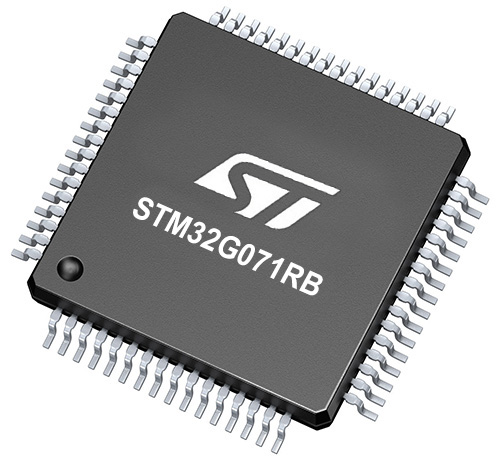
Architecture
ARM Cortex-M0
MCU Memory (KB)
128
Silicon Vendor
STMicroelectronics
Pin count
64
RAM (Bytes)
36864
You complete me!
Accessories
Click Shield for Nucleo-64 comes equipped with two proprietary mikroBUS™ sockets, allowing all the Click board™ devices to be interfaced with the STM32 Nucleo-64 board with no effort. This way, Mikroe allows its users to add any functionality from our ever-growing range of Click boards™, such as WiFi, GSM, GPS, Bluetooth, ZigBee, environmental sensors, LEDs, speech recognition, motor control, movement sensors, and many more. More than 1537 Click boards™, which can be stacked and integrated, are at your disposal. The STM32 Nucleo-64 boards are based on the microcontrollers in 64-pin packages, a 32-bit MCU with an ARM Cortex M4 processor operating at 84MHz, 512Kb Flash, and 96KB SRAM, divided into two regions where the top section represents the ST-Link/V2 debugger and programmer while the bottom section of the board is an actual development board. These boards are controlled and powered conveniently through a USB connection to program and efficiently debug the Nucleo-64 board out of the box, with an additional USB cable connected to the USB mini port on the board. Most of the STM32 microcontroller pins are brought to the IO pins on the left and right edge of the board, which are then connected to two existing mikroBUS™ sockets. This Click Shield also has several switches that perform functions such as selecting the logic levels of analog signals on mikroBUS™ sockets and selecting logic voltage levels of the mikroBUS™ sockets themselves. Besides, the user is offered the possibility of using any Click board™ with the help of existing bidirectional level-shifting voltage translators, regardless of whether the Click board™ operates at a 3.3V or 5V logic voltage level. Once you connect the STM32 Nucleo-64 board with our Click Shield for Nucleo-64, you can access hundreds of Click boards™, working with 3.3V or 5V logic voltage levels.
868MHz right-angle rubber antenna is a compact and versatile solution for wireless communication. Operating within the frequency range of 868-915MHz, it ensures optimal signal reception and transmission. With a 50-ohm impedance, it's compatible with various devices and systems. This antenna boasts a 2dB gain, enhancing signal strength and extending communication range. Its vertical polarization further contributes to signal clarity. Designed to handle up to 50W of input power, it's a robust choice for various applications. Measuring just 48mm in length, this antenna is both discreet and practical. Its SMA male connector ensures a secure and reliable connection to your equipment. Whether you're working with IoT devices, remote sensors, or other wireless technologies, the 868MHz right-angle antenna offers the performance and flexibility you need for seamless communication.
Used MCU Pins
mikroBUS™ mapper
Take a closer look
Click board™ Schematic
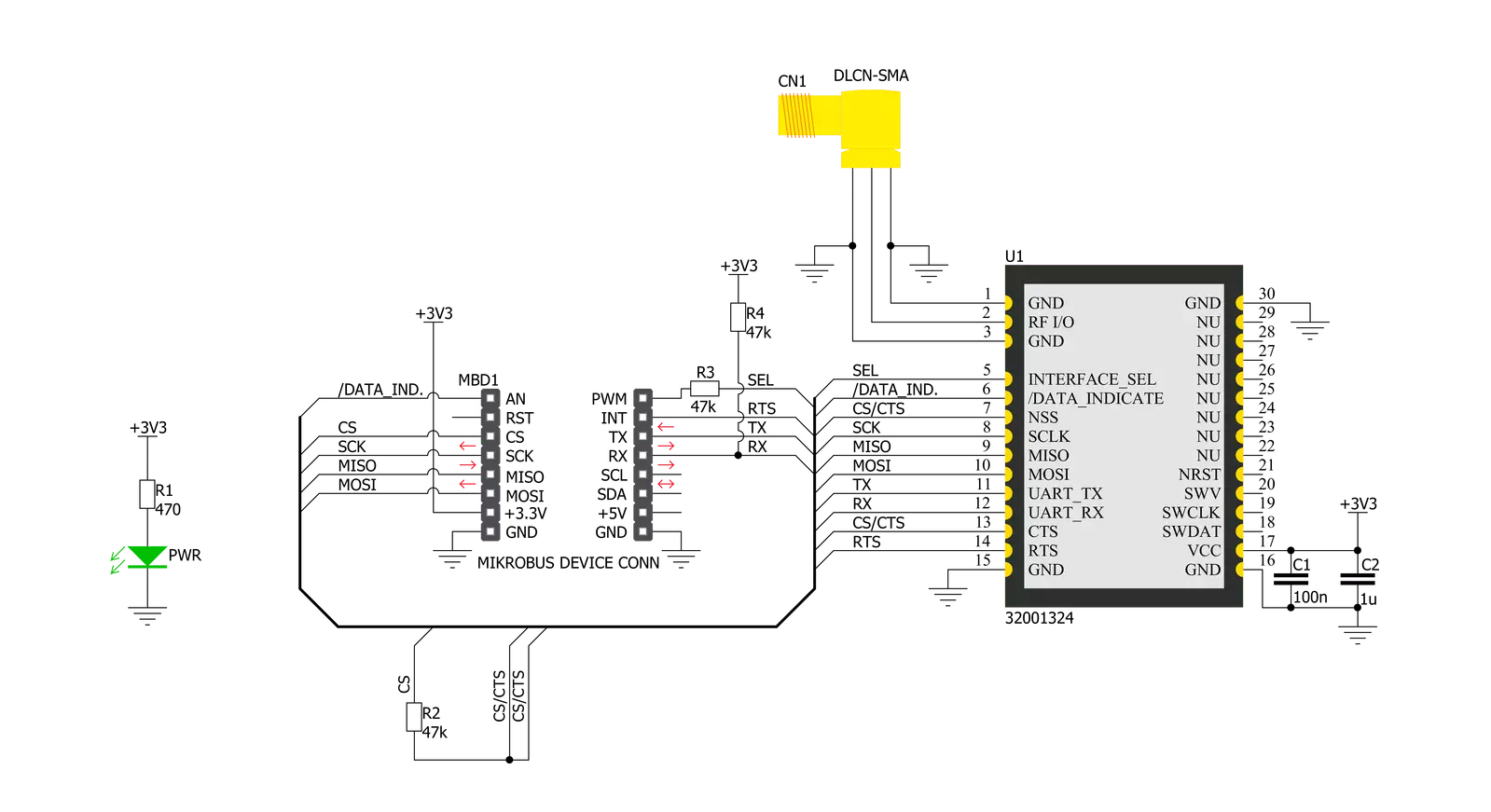
Step by step
Project assembly
Track your results in real time
Application Output
1. Application Output - In Debug mode, the 'Application Output' window enables real-time data monitoring, offering direct insight into execution results. Ensure proper data display by configuring the environment correctly using the provided tutorial.

2. UART Terminal - Use the UART Terminal to monitor data transmission via a USB to UART converter, allowing direct communication between the Click board™ and your development system. Configure the baud rate and other serial settings according to your project's requirements to ensure proper functionality. For step-by-step setup instructions, refer to the provided tutorial.
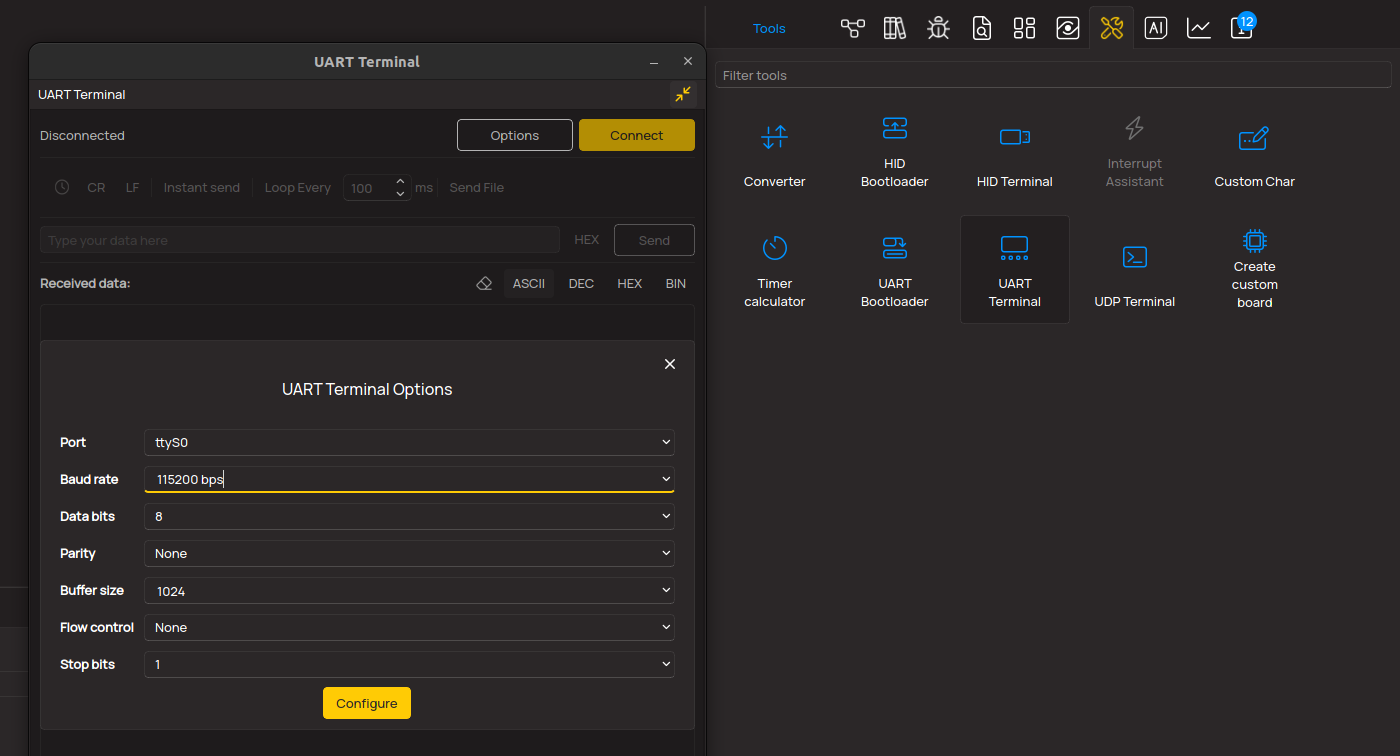
3. Plot Output - The Plot feature offers a powerful way to visualize real-time sensor data, enabling trend analysis, debugging, and comparison of multiple data points. To set it up correctly, follow the provided tutorial, which includes a step-by-step example of using the Plot feature to display Click board™ readings. To use the Plot feature in your code, use the function: plot(*insert_graph_name*, variable_name);. This is a general format, and it is up to the user to replace 'insert_graph_name' with the actual graph name and 'variable_name' with the parameter to be displayed.
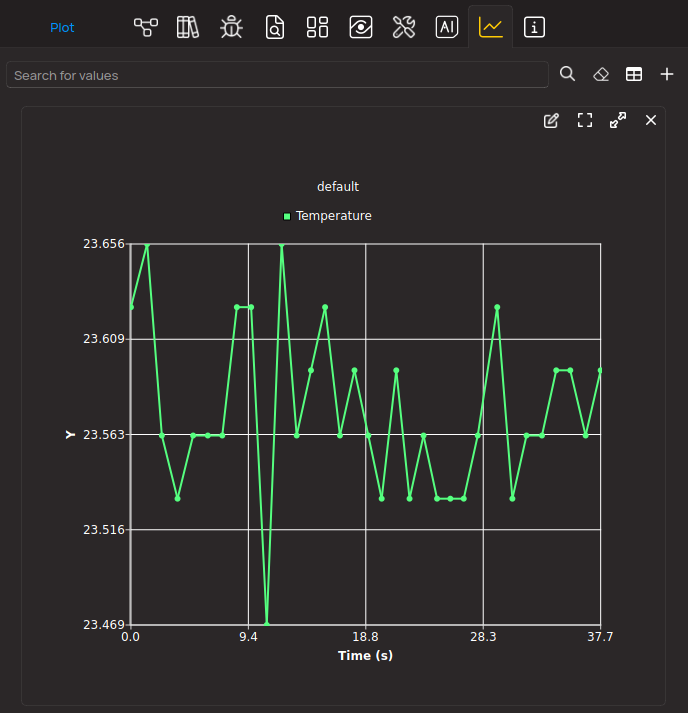
Software Support
Library Description
This library contains API for M-BUS RF 4 Click driver.
Key functions:
mbusrf4_send_command- Header and checksum are calculated and sent at the beginning (header) and finally (checksum)mbusrf4_generic_write- This function write specific number of data.mbusrf4_generic_read- This function read data of maximum length.
Open Source
Code example
The complete application code and a ready-to-use project are available through the NECTO Studio Package Manager for direct installation in the NECTO Studio. The application code can also be found on the MIKROE GitHub account.
/*!
* \file
* \brief MBusRf4 Click example
*
* # Description
* This example reads and processes data from M-BUS RF 4 Clicks.
*
* The demo application is composed of two sections :
*
* ## Application Init
* Initializes driver init, reads basic information and checks communication
*
* ## Application Task
* In the RX mode it is waiting to receive data from another module...
* In the TX mode sends the data packet....
*
* ## Additional Function
* - mbusrf4_process ( ) - The general process of collecting data and adding it to application buffer;
*
* - mbrusrf4_clear_buff ( void ) - Clear application buffer data;
*
* - mbusrf4_parser_tx ( void ) - Transmit data status parser;
*
* - mbusrf4_parser_rx ( uint8_t logg_type ) - Receiver data parser;
*
* - mbusrf4_log_data ( uint8_t log_type, uint8_t *log_buf, int32_t log_len ) - Log application buffer;
*
* ## Note: You can't send less then 10 data byte!
*
*
* \author MikroE Team
*
*/
// ------------------------------------------------------------------- INCLUDES
#include "board.h"
#include "log.h"
#include "mbusrf4.h"
#include "string.h"
#include "generic_pointer.h"
#define PROCESS_COUNTER 10
#define PROCESS_RX_BUFFER_SIZE 256
#define PROCESS_PARSER_BUFFER_SIZE 256
#define LOG_HEX 0
#define LOG_STR 1
#define LOG_DEC 2
// ------------------------------------------------------------------ VARIABLES
#define DEMO_APP_RECEIVER
// #define DEMO_APP_TRANSMITER
static mbusrf4_t mbusrf4;
static log_t logger;
static char parser_buf[ PROCESS_PARSER_BUFFER_SIZE ];
static int32_t parser_cnt = 0;
static uint8_t * __generic_ptr parser_ptr;
uint8_t msg[ ] = "MikroE - FW team";
// ------------------------------------------------------- ADDITIONAL FUNCTIONS
static void mbrusrf4_clear_buff ( void );
static void mbusrf4_parser_tx ( void );
static void mbusrf4_parser_rx ( uint8_t logg_type );
static void mbusrf4_process ( void );
static void mbusrf4_log_data ( uint8_t log_type, uint8_t *log_buf, int32_t log_len );
static void mbusrf4_process ( void )
{
int32_t rsp_size;
char uart_rx_buffer[ PROCESS_RX_BUFFER_SIZE ] = { 0 };
uint16_t check_buf_cnt;
uint8_t process_cnt = PROCESS_COUNTER;
rsp_size = mbusrf4_generic_read( &mbusrf4, uart_rx_buffer, PROCESS_RX_BUFFER_SIZE );
if ( rsp_size > 0 )
{
if ( parser_cnt + rsp_size >= PROCESS_PARSER_BUFFER_SIZE )
{
log_info( &logger, "Buffer Overflow!" );
mbrusrf4_clear_buff( );
}
else
{
for( int32_t rsp_cnt = 0; rsp_cnt < rsp_size; rsp_cnt++ )
{
parser_buf[ parser_cnt ] = uart_rx_buffer[ rsp_cnt ];
parser_cnt++;
if ( parser_cnt >= parser_cnt + rsp_size )
break;
}
}
}
}
static void mbusrf4_parser_rx ( uint8_t logg_type )
{
const int32_t RSP_LEN = 2;
const int32_t TIMEOUT_EXIT = 10000;
uint8_t * __generic_ptr rsp_start;
uint8_t full_rsp = 0;
int32_t timeout_cnt = 0;
int32_t rsp_len = 0;
int32_t rsp_start_index = 0;
for ( ; ; )
{
rsp_start = strchr( parser_ptr, MBUSRF4_HEADER );
if (rsp_start != 0)
break;
else
mbusrf4_process();
timeout_cnt++;
Delay_ms ( 1 );
if ( timeout_cnt >= TIMEOUT_EXIT )
{
log_error( &logger, "TIMEOUT!( Header not found )" );
mbrusrf4_clear_buff();
return;
}
}
timeout_cnt = 0;
for ( ; ; )
{
for ( int32_t cnt = 0; cnt < parser_cnt; cnt++ )
{
if ( rsp_start == ( parser_ptr + cnt ) )
{
if ( cnt + RSP_LEN <= parser_cnt )
{
rsp_start_index = cnt;
full_rsp = 1;
}
else
full_rsp = 0;
}
}
if ( full_rsp == 1 )
break;
else
mbusrf4_process();
timeout_cnt++;
Delay_ms ( 1 );
if ( timeout_cnt >= TIMEOUT_EXIT )
{
log_error( &logger, "TIMEOUT! ( Response length not found )" );
return;
}
}
timeout_cnt = 0;
rsp_len = ( int32_t )parser_buf[ rsp_start_index + 2 ];
if ( rsp_len <= 0 )
{
mbrusrf4_clear_buff();
return;
}
for ( ; ; )
{
if ( ( rsp_start_index + RSP_LEN + rsp_len + 1 ) <= parser_cnt )
full_rsp = 1;
else
full_rsp = 0;
if ( full_rsp == 1 )
break;
else
mbusrf4_process();
timeout_cnt++;
Delay_ms ( 1 );
if ( timeout_cnt >= TIMEOUT_EXIT )
{
log_error( &logger, "TIMEOUT! ( Response not found )" );
return;
}
}
rsp_start_index += 3;
mbusrf4_log_data( logg_type, &parser_buf[ rsp_start_index ], rsp_len );
mbrusrf4_clear_buff();
}
static void mbusrf4_parser_tx ( void )
{
const int32_t RSP_LEN = 4;
const int32_t STATUS_DIFF = 3;
const int32_t TIMEOUT_EXIT = 5000;
uint8_t * __generic_ptr rsp_start;
uint8_t full_rsp = 0;
int32_t timeout_cnt = 0;
for ( ; ; )
{
rsp_start = strchr( parser_ptr, MBUSRF4_HEADER );
if ( rsp_start != 0 )
break;
else
mbusrf4_process();
timeout_cnt++;
Delay_ms ( 1 );
if ( timeout_cnt >= TIMEOUT_EXIT )
{
log_error( &logger, "TIMEOUT!( Header not found )" );
return;
}
}
timeout_cnt = 0;
for ( ; ; )
{
for ( int32_t cnt = 0; cnt < parser_cnt; cnt++ )
{
if ( rsp_start == ( parser_ptr + cnt ) )
{
if ( cnt + RSP_LEN <= parser_cnt )
{
full_rsp = 1;
}
else
{
full_rsp = 0;
}
}
}
if ( full_rsp == 1 )
break;
else
mbusrf4_process();
timeout_cnt++;
Delay_ms ( 1 );
if ( timeout_cnt >= TIMEOUT_EXIT )
{
log_error( &logger, "TIMEOUT! ( Response not found )" );
return;
}
}
rsp_start += STATUS_DIFF;
if ( *rsp_start == 0x00 )
log_info( &logger, "TX OK" );
else if ( *rsp_start == 0xFF )
log_info( &logger, "TX ERROR" );
else
log_error( &logger, "TX PARSER ERROR" );
}
static void mbrusrf4_clear_buff ( void )
{
memset( parser_buf, 0, parser_cnt );
parser_cnt = 0;
}
static void mbusrf4_log_data ( uint8_t log_type, uint8_t *log_buf, int32_t log_len )
{
if ( LOG_HEX == log_type )
{
for ( int32_t data_cnt = 0; data_cnt < log_len; data_cnt++ )
{
log_printf( &logger, "[ 0x%.02X ]", ( int32_t )( *( log_buf + data_cnt ) ) );
}
}
else if( LOG_STR == log_type )
{
for ( int32_t data_cnt = 0; data_cnt < log_len; data_cnt++ )
{
log_printf( &logger, "%c", *( log_buf + data_cnt ) );
}
}
else if( LOG_DEC == log_type )
{
for ( int32_t data_cnt = 0; data_cnt < log_len; data_cnt++ )
{
log_printf( &logger, "%d", ( int32_t )( *( log_buf + data_cnt ) ) );
}
}
else
{
log_error( &logger, "Log type error!" );
}
log_printf( &logger, "\r\n" );
}
// ------------------------------------------------------ APPLICATION FUNCTIONS
void application_init ( void )
{
log_cfg_t log_cfg;
mbusrf4_cfg_t cfg;
uint8_t payload_buff[ 20 ] = { 0 };
/**
* Logger initialization.
* Default baud rate: 115200
* Default log level: LOG_LEVEL_DEBUG
* @note If USB_UART_RX and USB_UART_TX
* are defined as HAL_PIN_NC, you will
* need to define them manually for log to work.
* See @b LOG_MAP_USB_UART macro definition for detailed explanation.
*/
LOG_MAP_USB_UART( log_cfg );
log_init( &logger, &log_cfg );
log_info( &logger, "Application Init" );
// Click initialization.
mbusrf4_cfg_setup( &cfg );
MBUSRF4_MAP_MIKROBUS( cfg, MIKROBUS_1 );
mbusrf4_init( &mbusrf4, &cfg );
parser_cnt = 0;
parser_ptr = &parser_buf[ 0 ];
mbusrf4_process( );
mbrusrf4_clear_buff();
//Command SET mode
payload_buff[ 0 ] = MBUSRF4_SET_VALUE_IN_EEPROM_MEMORY;
payload_buff[ 1 ] = MBUSRF4_EEPARAM_WMBUS_MODE_S2_SHORT_PREAMBLE;
mbusrf4_send_command( &mbusrf4, MBUSRF4_CMD_SET_MODE, 2, &payload_buff[ 0 ] );
Delay_ms ( 500 );
mbusrf4_process( );
mbusrf4_parser_tx();
mbrusrf4_clear_buff();
// Reads FW version
mbusrf4_send_command( &mbusrf4, MBUSRF4_CMD_GET_FW_VERSION, 0, &payload_buff[ 0 ] );
Delay_ms ( 500 );
mbusrf4_process( );
log_info( &logger, "FW version:" );
mbusrf4_parser_rx( LOG_HEX );
log_printf( &logger, "-----------------------------------------------------------\r\n" );
mbusrf4_process( );
Delay_ms ( 1000 );
log_info( &logger, "Application Task" );
}
void application_task ( void )
{
// RX App mode
#ifdef DEMO_APP_RECEIVER
if ( mbusrf4_get_state_ind( &mbusrf4 ) == 0 )
{
Delay_ms ( 100 );
mbusrf4_process( );
mbusrf4_parser_rx( LOG_STR );
}
#endif
// TX App Mode
#ifdef DEMO_APP_TRANSMITER
mbusrf4_transmit_data( &mbusrf4, msg, 17 );
Delay_ms ( 100 );
mbrusrf4_clear_buff();
mbusrf4_parser_tx();
Delay_ms ( 1000 );
Delay_ms ( 1000 );
#endif
}
int main ( void )
{
/* Do not remove this line or clock might not be set correctly. */
#ifdef PREINIT_SUPPORTED
preinit();
#endif
application_init( );
for ( ; ; )
{
application_task( );
}
return 0;
}
// ------------------------------------------------------------------------ END
Additional Support
Resources
Category:Sub-1 GHz Transceievers
